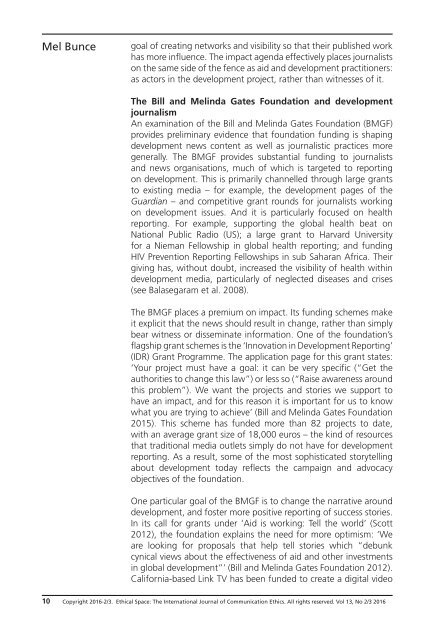Beyond clickbait and commerce
v13n2-3
v13n2-3
You also want an ePaper? Increase the reach of your titles
YUMPU automatically turns print PDFs into web optimized ePapers that Google loves.
Mel Bunce<br />
goal of creating networks <strong>and</strong> visibility so that their published work<br />
has more influence. The impact agenda effectively places journalists<br />
on the same side of the fence as aid <strong>and</strong> development practitioners:<br />
as actors in the development project, rather than witnesses of it.<br />
The Bill <strong>and</strong> Melinda Gates Foundation <strong>and</strong> development<br />
journalism<br />
An examination of the Bill <strong>and</strong> Melinda Gates Foundation (BMGF)<br />
provides preliminary evidence that foundation funding is shaping<br />
development news content as well as journalistic practices more<br />
generally. The BMGF provides substantial funding to journalists<br />
<strong>and</strong> news organisations, much of which is targeted to reporting<br />
on development. This is primarily channelled through large grants<br />
to existing media – for example, the development pages of the<br />
Guardian – <strong>and</strong> competitive grant rounds for journalists working<br />
on development issues. And it is particularly focused on health<br />
reporting. For example, supporting the global health beat on<br />
National Public Radio (US); a large grant to Harvard University<br />
for a Nieman Fellowship in global health reporting; <strong>and</strong> funding<br />
HIV Prevention Reporting Fellowships in sub Saharan Africa. Their<br />
giving has, without doubt, increased the visibility of health within<br />
development media, particularly of neglected diseases <strong>and</strong> crises<br />
(see Balasegaram et al. 2008).<br />
The BMGF places a premium on impact. Its funding schemes make<br />
it explicit that the news should result in change, rather than simply<br />
bear witness or disseminate information. One of the foundation’s<br />
flagship grant schemes is the ‘Innovation in Development Reporting’<br />
(IDR) Grant Programme. The application page for this grant states:<br />
‘Your project must have a goal: it can be very specific (“Get the<br />
authorities to change this law”) or less so (“Raise awareness around<br />
this problem”). We want the projects <strong>and</strong> stories we support to<br />
have an impact, <strong>and</strong> for this reason it is important for us to know<br />
what you are trying to achieve’ (Bill <strong>and</strong> Melinda Gates Foundation<br />
2015). This scheme has funded more than 82 projects to date,<br />
with an average grant size of 18,000 euros – the kind of resources<br />
that traditional media outlets simply do not have for development<br />
reporting. As a result, some of the most sophisticated storytelling<br />
about development today reflects the campaign <strong>and</strong> advocacy<br />
objectives of the foundation.<br />
One particular goal of the BMGF is to change the narrative around<br />
development, <strong>and</strong> foster more positive reporting of success stories.<br />
In its call for grants under ‘Aid is working: Tell the world’ (Scott<br />
2012), the foundation explains the need for more optimism: ‘We<br />
are looking for proposals that help tell stories which “debunk<br />
cynical views about the effectiveness of aid <strong>and</strong> other investments<br />
in global development”’ (Bill <strong>and</strong> Melinda Gates Foundation 2012).<br />
California-based Link TV has been funded to create a digital video<br />
10 Copyright 2016-2/3. Ethical Space: The International Journal of Communication Ethics. All rights reserved. Vol 13, No 2/3 2016


